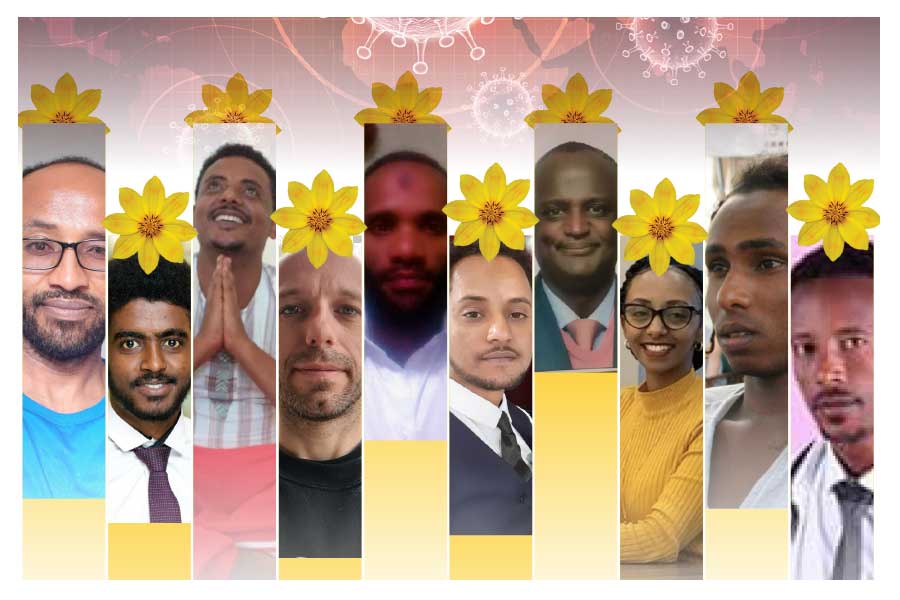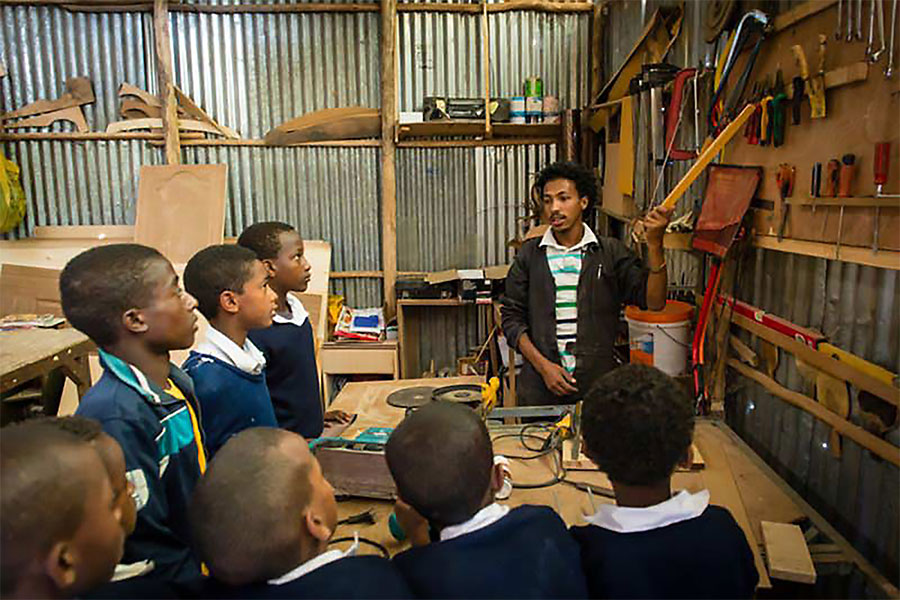
News Analysis | Mar 09,2024
Mar 21 , 2020
By Dawit Wondimagegn
As Ethiopia works hard to navigate the current COVID-19 epidemic, we may also turn to history to check if it has any messages for us, writes Dawit Wondimagegn (MD) (dawitwondimagegn@gmail.com), associate professor of psychiatry at Addis Abeba University’s School of Medicine and chief executive director of Tikur Anbessa Hospital. His views are personal and do not represent the opinion of any institution.
As we remain alert and calm in the COVID-19 era, we might as well take a break from 'now’ and explore the recesses of history where we may find refuge!
From the beginning of time, human beings have shared the same challenges. The illusion of contemporary time tricks us into thinking that the current moment is different and unique, forgetting that it is all a continuation of some sort. We very rarely encounter something completely new. We live in a time capsule where the past is a constant presence in the form of history. In a way, history is not in the past; rather it is constantly influencing the now and the future.
The history of medicine is the capsule we health professionals live in. We are as much part of the past as the future. What we know and do not know about health and disease only varies with the challenges of time. Thus, we have to look at our history in search of wisdom and comfort. Wisdom in the sense that the people who walked the same paths before us have left us knowledge, and comfort in the sense that studying what they had to contend with will give us insight into our own, similar struggles.
As we navigate through the current COVID-19 epidemic, as much as we work hard to deal with it, we may also turn to history to check if it has any messages for us.
The plague of Athens, in 430 BC, is said to be the first recorded epidemic the world experienced. The Greek historian Thucydides told, in his writing, "History of the Peloponnesian War," the story of a lethal contagion which afflicted the Athenians while they were under siege by the Spartans. The symptoms of this disease were fever, painful skin rash and great thirst (dehydration). The people who died first were the physicians that came in contact with cases. It affected and killed many, including the leader of the Athenians, Pericles. Thucydides himself was a survivor. It was also said to have infected birds and other animals.
The origins of the disease were unknown. Thus, many assumptions were made: some said it was imported from Africa and others said it was a result of starvation and the strife of war. There were also people who said it was the poisoning of the water wells by the enemy, while religious people said it was a result of punishment for sins. Neither priests, oracles nor doctors were equipped to alleviate the suffering and death. To date, no attempt at a retrospective diagnosis has conclusively identified what it was.
This epidemic passed but not without impact: social structures decayed, crime was rampant, social ethics and behaviours were abandoned, people were not kind to the sick; they even shunned their own friends and family. Politically, Athens lost the war and never returned to its glory days.
This story exemplifies the timeless effects of epidemics from which some parallels to today can be drawn.
The oldest and most typical human response to an epidemic is panic, which leads to a breakdown of social order; the panic we are witnessing with COVID-19 is expected. We will start to see a breakdown in social order and norms until some sort of a ‘new normal’ is established. Therefore, do not be alarmed and surprised if we start to see people not following orders, and some making their own decisions. It is done out of fear and desperation. The only remedy to combat epidemics is direct and clear information - the rest is all technical. Somebody needs to control the message and provide a direct and clear message based on facts.
When we give people clear information they will continue to be civil. The information people are getting now in our country comes from everywhere and anywhere; this has created a lot of fear and desperation among people. There needs to be one source of information about the national status of the epidemic, and that source should engage with the public with the right information.
We also need to remember that false assumptions are common, as people seek to find an explanation to understand what is happening around them. This does not stop or change the course of an epidemic but shapes how we may respond to it. When we are not sure of what is going on, it is human nature to be irrational. We have to be clear with people when we communicate what this disease is and what it is not.
COVID-19 is a viral disease. It is transmitted through close contact. Some people will not get it while the great majority of people who will have it will recover in a few weeks, and some will need hospital admission and treatment. Unfortunately, a small percentage of those who catch the disease will die.
When we give people the right information, they will continue to be ‘rational.’
We have to deal with paranoia and conspiracies, which are part of the process of understanding as people want to have mental models of both risk and mitigation. People will ask the legitimate question: If the disease is as described above why are we all so concerned?
The answer is that every health system has a limited capacity, meaning the total number of patents that can be provided care at one time is limited. It does not matter whether it is a poor or rich country - every system has its maximum capacity. Once that is reached then it becomes almost impossible to provide any care. This will kill many people. This is why we all are worried about COVID-19. If many people get sick at the same time, we will not be able to provide care for all of them. This will especially affect people who are already sick and need care.
This is why we have to take the social distancing and hygiene messages seriously. If we could limit the number of people that get sick to a minimum for a longer period of time, the health system will be able to accommodate them.
When we give people accurate and honest information, they will continue to trust their neighbors and the authorities.
We have to support health professionals who are always at the forefront of these wars, it is both their calling and their Achilles Heel, depending on how supported they are. Now is time more than ever to think about health professionals and all health care personnel. These include not only doctors, nurses, laboratory technologist and pharmacy professionals, but also the guards, cleaners, oxygen suppliers, clerks, electricians, plumbers, laundry and kitchen workers and, of course, the management.
A hospital is an industry with complex open and closed subsystems. We all need to be in sync to stand any chance of overcoming the COVID-19 epidemic. We should remember that these are the people who will guide us through this process. We have to provide them with the right evidence and protection.
When we give people evidence-based information, they will be reassured.
An epidemic impacts all dimensions of life from the personal to the political. This creates interest groups who will use this as an opportunity to advance their causes, to fill up their pockets, to score favours and make friends or get back at former foes. This will create more confusion and panic in the weeks to come. The only way out is the provision of information with consistency. When we give people consistent information, they will continue to endure.
The contrast between the Plague of Athens and the COVID-19 epidemic is not in the basic facts or the way people are responding to each other. It is rather in the advantage we have over our predecessors. We have the most powerful tool of all: the ability to generate and use information.
It cannot be said enough. The only and most important remedy to combat epidemics is direct and clear information, while the rest is all technical. Somebody needs to control the message and provide direct, consistent and clear messages based on facts.
Dawit Wondimagegn (MD) is associate professor of psychiatry at Addis Abeba University’s School of Medicine and chief executive director of Tikur Anbessa Hospital. His views are personal and do not represent the opinion of any institution. He can be reached at dawitwondimagegn@gmail.com.
PUBLISHED ON
Mar 21,2020 [ VOL
20 , NO
1038]


News Analysis | Mar 09,2024

Fortune News | Sep 11,2020

Radar | Oct 26,2019

View From Arada | Sep 03,2022

My Opinion | Jun 15,2024

View From Arada | May 29,2021

Sunday with Eden | Mar 01,2024

Commentaries | Mar 28,2020

Radar | Jan 27,2024

Viewpoints | Jan 09,2021

My Opinion | 131584 Views | Aug 14,2021

My Opinion | 127940 Views | Aug 21,2021

My Opinion | 125915 Views | Sep 10,2021

My Opinion | 123539 Views | Aug 07,2021

Dec 22 , 2024 . By TIZITA SHEWAFERAW
Charged with transforming colossal state-owned enterprises into modern and competitiv...

Aug 18 , 2024 . By AKSAH ITALO
Although predictable Yonas Zerihun's job in the ride-hailing service is not immune to...

Jul 28 , 2024 . By TIZITA SHEWAFERAW
Unhabitual, perhaps too many, Samuel Gebreyohannes, 38, used to occasionally enjoy a couple of beers at breakfast. However, he recently swit...

Jul 13 , 2024 . By AKSAH ITALO
Investors who rely on tractors, trucks, and field vehicles for commuting, transporting commodities, and f...

Jun 28 , 2025
Meseret Damtie, the assertive auditor general, has never been shy about naming names...

Jun 21 , 2025
A well-worn adage says, “Budget is not destiny, but it is direction.” Examining t...

Jun 14 , 2025
Yet again, the Horn of Africa is bracing for trouble. A region already frayed by wars...

Jun 7 , 2025
Few promises shine brighter in Addis Abeba than the pledge of a roof for every family...

Jun 29 , 2025
Addis Abeba's first rains have coincided with a sweeping rise in private school tuition, prompting the city's education...

Jun 29 , 2025 . By BEZAWIT HULUAGER
Central Bank Governor Mamo Mihretu claimed a bold reconfiguration of monetary policy...

Jun 29 , 2025 . By BEZAWIT HULUAGER
The federal government is betting on a sweeping overhaul of the driver licensing regi...

Jun 29 , 2025 . By NAHOM AYELE
Gadaa Bank has listed 1.2 million shares on the Ethiopian Securities Exchange (ESX),...